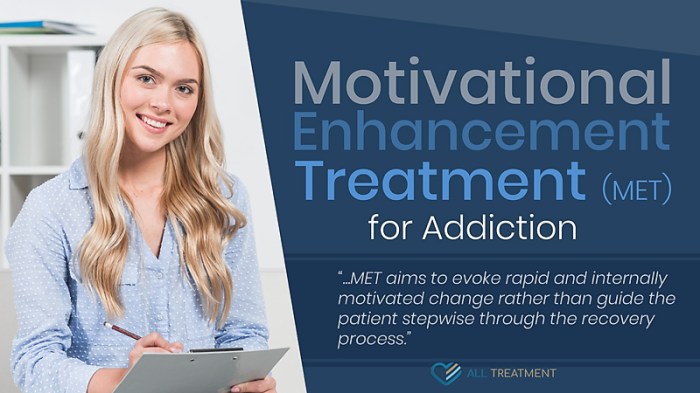According to the text motivational enhancement therapy – According to the text, motivational enhancement therapy (MET) is a client-centered approach that empowers individuals to make lasting behavioral changes. This evidence-based therapy focuses on fostering intrinsic motivation, collaboration, and self-efficacy to guide clients through the stages of change.
MET’s multifaceted approach involves active listening, reflective listening, and summarizing techniques to create a supportive and non-judgmental environment. It recognizes the unique challenges and motivations of each individual, tailoring interventions to their specific needs.
Definition of Motivational Enhancement Therapy (MET)
Motivational Enhancement Therapy (MET) is a client-centered counseling approach designed to help individuals explore and resolve ambivalence about changing their behavior. It aims to increase intrinsic motivation for change by fostering self-awareness, self-efficacy, and a sense of empowerment.
Components of MET
Empathy
MET therapists demonstrate empathy and understanding towards clients, creating a safe and supportive environment that encourages open communication and self-reflection.
Collaboration
MET is a collaborative process where therapists and clients work together to identify and address the client’s goals and concerns. Therapists empower clients to take an active role in their recovery journey.
Self-Efficacy
MET aims to enhance clients’ self-efficacy by helping them recognize their strengths and abilities. Therapists encourage clients to set realistic goals and provide support and guidance throughout the change process.
Techniques Used in MET
Active Listening
MET therapists practice active listening, paying close attention to both verbal and non-verbal cues to fully understand clients’ perspectives and concerns.
Reflective Listening
Therapists use reflective listening to restate and summarize clients’ statements, ensuring accurate understanding and fostering a sense of validation.
Summarizing
MET therapists summarize key points and themes from clients’ narratives to help them gain clarity and identify patterns in their thoughts and behaviors.
Stages of MET

Pre-Contemplation, According to the text motivational enhancement therapy
Clients are unaware or unwilling to change their behavior. Therapists help clients recognize the potential benefits of change and address barriers.
Contemplation
Clients are considering change but may be ambivalent. Therapists assist clients in weighing the pros and cons of change and developing a plan.
Preparation
Clients are ready to make a change and begin to take action. Therapists provide support and guidance as clients set goals and develop coping mechanisms.
Action
Clients are actively engaged in changing their behavior. Therapists monitor progress and provide reinforcement to maintain motivation.
Maintenance
Clients have made lasting changes and are working to prevent relapse. Therapists assist clients in developing strategies to manage triggers and maintain healthy behaviors.
Evidence-Based Research on MET

Numerous studies have demonstrated the effectiveness of MET in promoting behavior change. MET has been shown to reduce substance use, improve mental health outcomes, and increase physical activity.
Applications of MET
Populations
- Individuals with substance use disorders
- People with mental health conditions
- Individuals with chronic health conditions
Settings
- Outpatient clinics
- Inpatient treatment facilities
- Primary care settings
Training and Certification in MET

Formal training and certification in MET are available through various organizations. Training typically includes coursework, supervised practice, and a written examination.
Benefits of Training
- Enhanced understanding of MET principles and techniques
- Increased competence in providing MET interventions
- Improved client outcomes
FAQs: According To The Text Motivational Enhancement Therapy
What is the purpose of MET?
MET aims to enhance intrinsic motivation for behavior change, empowering individuals to make lasting and meaningful changes.
How does MET work?
MET utilizes a collaborative approach, focusing on empathy, active listening, and self-efficacy to guide clients through the stages of change.
Is MET effective?
Research has consistently demonstrated the effectiveness of MET in promoting behavior change across various populations and target behaviors.
Who can benefit from MET?
MET is suitable for individuals seeking to make positive changes in their behavior, including those struggling with substance use, unhealthy habits, or chronic conditions.